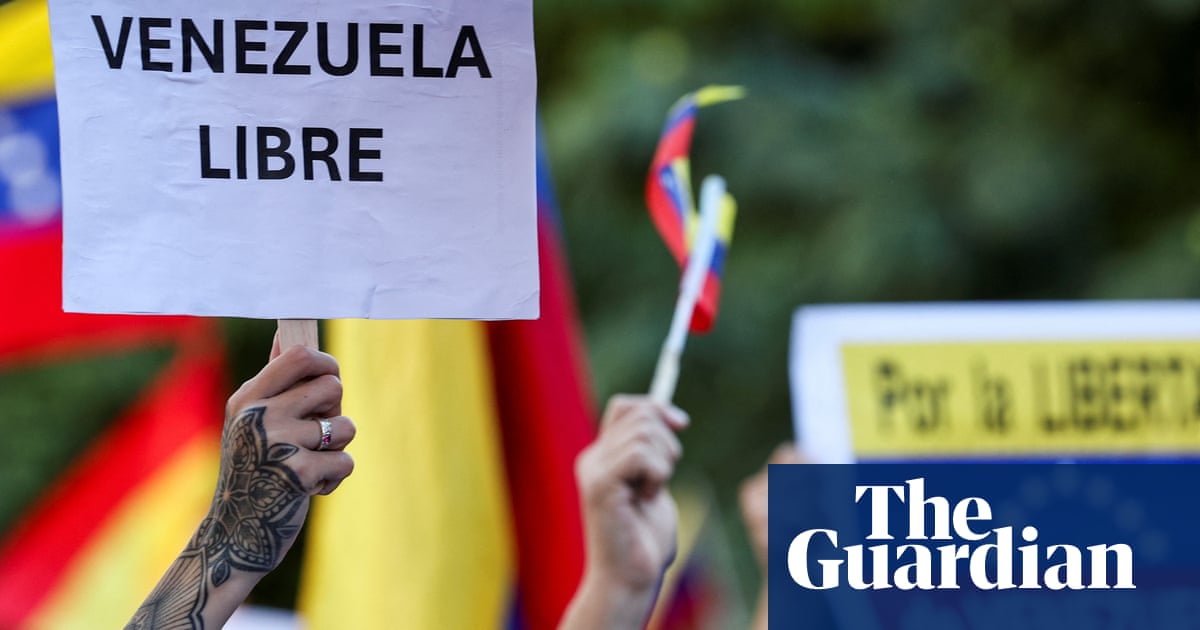
Against all the odds, they pulled off a once-inconceivable democratic victory against one of the world’s most unyielding authoritarian regimes. Even more astonishingly, Venezuela’s opposition activists managed to prove it, gathering a vast cache of voting data that offered concrete proof of their success.
Yet six weeks after Venezuela’s presidential election, it was the candidate widely believed to have won the vote, Edmundo González, who has flown into exile in Spain, while the apparent loser, Nicolás Maduro, looks set to keep power.
“Is this game over?” one of the country’s top journalists, Luz Mely Reyes, asked of the opposition challenge in El País – a question now on many people’s lips.
Opposition leaders are adamant their campaign to remove Maduro – widely blamed for leading the oil-rich country into economic turmoil and autocracy – is very much alive, even now the man they believe should replace him is stuck in Spain.
“28 July was a definitive blow to Maduro. I don’t know if it’s going to be a slow end or if it’s going to be quicker, as we want,” said activist Roberto Patiño, who backed González’s presidential campaign. “But … it’s very difficult to sustain a regime when everybody – including your closest collaborators and the military – knows you lost badly.”
During an online forum on Monday, political and civil society leaders urged opposition supporters not to lose hope. “I’m a man of great faith and I’m convinced that victory will come,” declared Lorenzo Tovar, from the Venezuelan Christian Front.
María Corina Machado, the banned opposition leader in whose place González ran in the election, continued to insist that her exiled substitute would become president on 10 January 2025. “All of us know that 28 July represents the end of a political cycle and the start of a new era,” claimed Machado, before calling for fresh protests on Wednesday.
Yet González’s hopes of taking office now look remote, given Maduro’s determination to cling on through a harsh political crackdown that has seen nearly 2,000 people jailed and more than 20 killed.
“I can understand the political reasons for maintaining an optimistic message, but I don’t think that there’s more than a sliver of a chance that Edmundo González will be sworn in as president on 10 January,” said Phil Gunson, a Caracas-based political analyst for the International Crisis Group who believed the opposition needed a new gameplan.
“If the opposition strategy is to hold the occasional rally and to insist that Edmundo is the president-elect and will – by some act of God – be installed in the presidency in January, then that’s not going to work. There’s a need for another strategy that keeps their movement alive,” Gunson said.
Quite what that strategy might be is unclear, although for now it still appears to hinge on persuading members of Venezuela’s armed forces or regime members to abandon their boss and negotiate a transition.
Patiño believed outside help was needed to convince those around Maduro to break ranks. “I think the international community should make a very substantial offer … for people in the regime to consider a better alternative for the country,” he said.
But such carrots have not worked in the past. The US reportedly offered Maduro amnesty during secret talks in Doha last year but he has yet to bite. Nor has there been any hint of a military uprising, with commanders and troops repeatedly appearing on state television to bellow their Chavista motto: “Always loyal! Never traitors!”
The leftwing presidents of Brazil and Colombia, Luiz Inácio Lula da Silva and Gustavo Petro, have been trying to stimulate dialogue between the two sides in the hope of a peaceful resolution. “That’s the most innovative and interesting unpredictable element [here],” said David Smilde, a Venezuela expert from Tulane University. But Maduro had shown little interest in the initiative, with one top ally recently mocking the Brazilian foreign policy guru spearheading the effort.
Beyond the South American diplomatic push it was unclear what the democratic world could do. “Nobody believes there’s going to be any kind of military action. Nobody really believes in sanctions any more,” said Smilde, who thought the US would focus such penalties on individuals involved in the alleged attempt to steal the election and post-election repression.
Nor was there any appetite to recognize another parallel administration, as happened in 2019 when more than 50 governments backed Juan Guaidó’s failed attempt to topple Maduro.
All of which suggested Maduro – who also retains the support of China, Russia and Iran – would remain in power, despite being “steamrolled” in the election and his regime exposed as “an old-fashioned dictatorship”.
“That’s my default scenario. That’s what I think will happen,” said Smilde, although he cautioned that the situation remained unpredictable. “Things can suddenly change from one day to the next.”
Gunson also thought short-term change unlikely, “short of an actual invasion, of course, which isn’t gonna happen”.
That was not to say the opposition’s efforts had been in vain or its challenge completely extinguished. “It’s easy to sit and criticize, but I have great admiration for the way this victory was achieved,” Gunson said, pondering the immense challenge of overcoming an authoritarian regime that had taken an even more repressive turn after the election. “Even if you were the most brilliant political strategist in the world, to devise a strategy for them now would be far from easy.”
Patiño, who like González has been forced into exile, recognized there was sadness and frustration that Maduro had refused to budge. “[But] I also feel that we are closer to change now than we were on 27 July,” he said, rejecting the idea that Venezuela was doomed to follow the paths of Cuba and Nicaragua into full-blown dictatorship.
“In Venezuela we had a watershed moment – a turning point when Venezuelan people voted massively against the regime – and everybody knows that the regime lost.”
“Nobody can predict when [the regime will fall],” Patiño added. “But the conditions for Venezuela to transition to democracy are there.”
Source: theguardian.com

















